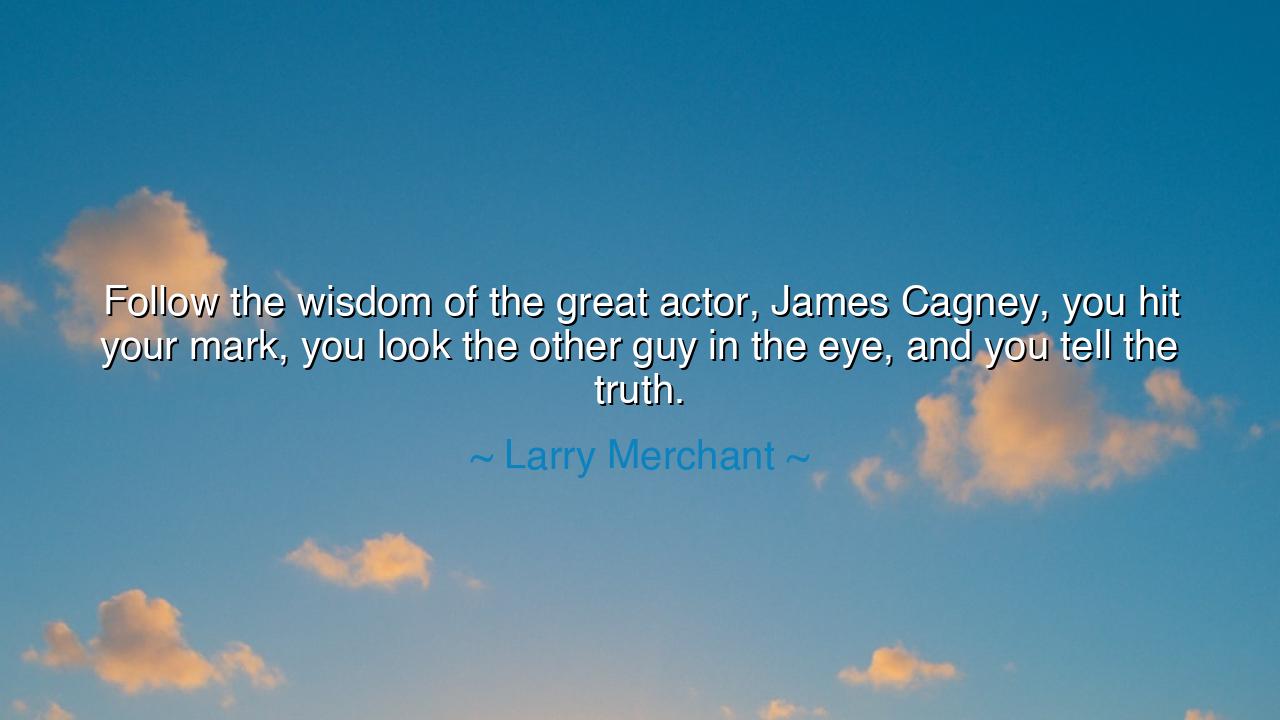
Follow the wisdom of the great actor, James Cagney, you hit your
Follow the wisdom of the great actor, James Cagney, you hit your mark, you look the other guy in the eye, and you tell the truth.






Hearken, children of the ages, to the instructive words of Larry Merchant, who declared: “Follow the wisdom of the great actor, James Cagney, you hit your mark, you look the other guy in the eye, and you tell the truth.” In these words lies the eternal truth of discipline, integrity, and the art of authenticity. To act with precision, to face others directly, and to speak truthfully is not merely the craft of performance—it is the guiding principle of honorable conduct in all arenas of life.
Merchant teaches that success in any endeavor requires mastery of fundamentals. To “hit your mark” signifies preparation, focus, and deliberate effort, whether on stage, in the arena of debate, or in the trials of life. It is the attentive discipline to place oneself exactly where one ought, at the right moment, that allows truth and character to be expressed fully. Without such grounding, words and deeds falter, and meaning is lost.
Consider the life of Abraham Lincoln, who faced adversaries in courts, councils, and the tumult of civil war. Like Cagney, he “looked the other guy in the eye,” confronting foes and allies alike with courage and forthrightness. His power lay not in artifice, but in honesty and precision—speaking truth as he understood it, at the moment it was required. Merchant’s reflection finds its living embodiment in Lincoln: the integrity of action and speech commands respect and shapes history.
The ancients themselves revered the union of discipline and truth. Greek tragedians trained rigorously to inhabit their roles with authenticity, while Roman orators honed their rhetoric to persuade without deceit. Merchant’s counsel echoes this timeless wisdom: authenticity in performance mirrors authenticity in life, and mastery of one’s role—whether upon stage, battlefield, or council—demands courage, honesty, and presence.
Thus, his teaching is both guidance and exhortation: prepare diligently, engage fully, confront others with clarity, and speak truth as you see it. The power of human action lies not merely in appearance or assertion, but in the alignment of skill, integrity, and authenticity, which compels trust, influence, and enduring impact.
Carry this teaching, children of generations yet unborn: in all endeavors, whether in art, leadership, or daily interaction, remember to hit your mark, meet others with honesty, and speak the truth. In these simple yet profound acts lies the wisdom of the ancients, the mastery of the craftsman, and the enduring power to shape lives, hearts, and history itself.






TTHong Diep Tran Thi
This quote feels motivational yet deeply reflective. It reminds me that truth and presence create impact far more than rehearsed perfection ever could. I’d like to know whether Merchant saw this as advice for communication in general or specifically for athletes and performers. Either way, it makes me think that authenticity might be the ultimate skill—something simple to describe but incredibly hard to sustain.
JTJuly Tran
I love the theatrical metaphor here—it feels like a life lesson disguised as acting advice. Every day we’re on some kind of stage, whether at work, in relationships, or online. The idea of ‘hitting your mark’ and ‘telling the truth’ makes me wonder if life’s best performances come from self-awareness rather than perfection. Could it be that being genuine is the most convincing act of all?
QKTran Quoc Khanh
This line resonates with me because it captures the beauty of simplicity in performance and in human interaction. It feels like a formula for integrity—show up, engage sincerely, and be real. Yet I can’t help but ask: do people in modern society still value raw honesty, or have we become too accustomed to filters and facades? Maybe the hardest ‘mark’ to hit today is authenticity itself.
Yy.nhi
There’s something deeply human about this advice—it blends professionalism with moral clarity. I’m curious, though: how does one ‘tell the truth’ when truth itself is subjective or emotionally charged? In acting, it’s about believability, but in real life, it can cost relationships or reputations. Maybe Merchant’s reference reminds us that truth-telling isn’t just about honesty, but courage under scrutiny.
DXCong an tinh da xem
I find this quote both practical and poetic. It makes me think about how often people overcomplicate communication, whether on stage or in everyday life. Looking someone in the eye and being truthful sounds simple, but it’s actually rare. Do you think authenticity can be taught, or is it something that has to be lived and felt? Cagney’s wisdom feels timeless yet difficult to practice consistently.